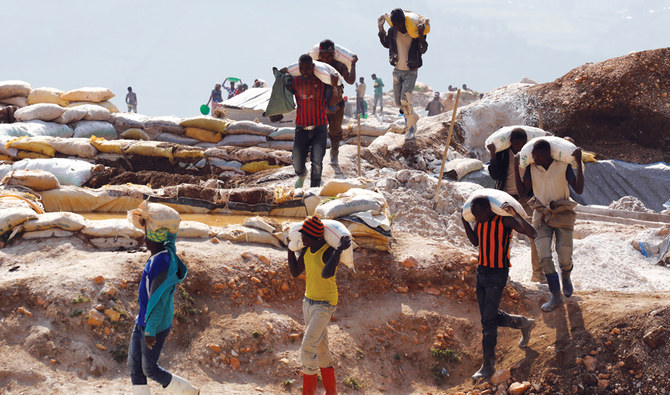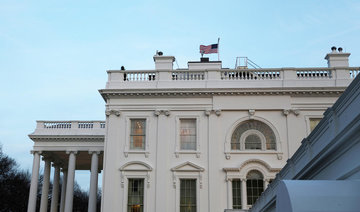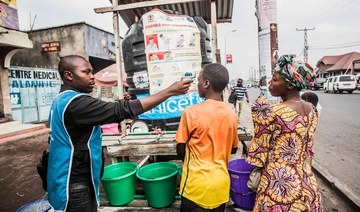RUBAYA: In a small shack overlooking muddy pits hewn out of eastern Congo’s rolling green hills, a government official puts a barcoded tag on a sack of ore rich in tantalum, a rare metal widely used in smartphones.
With a handheld device linked to a server, the agent scans the barcode, uploading data including the sealed bag’s weight, when it was tagged, and by whom.
It’s the latest initiative in the Democratic Republic of Congo to improve systems meant to show minerals entering global supply chains come from mines not using child labor or funding warlords.
The system developed by RCS Global, a Berlin company that audits supply chains, started in January at Societe Miniere de Bisunzu’s (SMB) mine near Rubaya, which has large deposits of coltan, a tantalum-rich ore.
“It allows purchasers of SMB material to be sure that it actually comes from that mine site and is not smuggled into the supply chain from other mines, as much as possible,” said Ferdinand Maubrey, a managing director at RCS.
Whether the new digital approach to tracing metals succeeds is of keen interest to many companies, as regulators on both sides of the Atlantic apply pressure to prove supply chains are clean.
Now, companies mostly rely on a paper-based certification scheme. But UN experts have documented cases of tags used to identify clean minerals being stolen in another part of eastern Congo and sold to smugglers — allowing them to pass off ore from blacklisted mines as responsibly sourced.
Maubrey said the new system had helped prevent tainted ore being mixed in with SMB’s products by creating new obstacles. To use stolen tags, for example, a smuggler would also need to steal both the scanner and the laptop linked to it — which Maubrey said would be easily detected.
Even so, he conceded the system has limitations. For one, it does not use available technology to pinpoint the GPS coordinates of where the ore was tagged in real time, largely because of the high costs involved, he said.
SMB Chief Executive Ben Mwangachuchu also said digital systems could be corrupted if the government agents who tag bags conspire with smugglers to enter incorrect data from the outset.
“If they collude and say we are going to feed the information we want ... for our own benefit, you will never know,” he said.
Car companies and electronics firms such as Apple, Samsung and IBM are all under pressure to show metals used in products such as laptops, video game consoles or electric vehicle batteries are sourced responsibly.
In response to the role minerals from Congo and East African neighbors played in funding conflicts, the US passed legislation in 2010 requiring US-listed companies to disclose whether their products contained any tantalum, tin, tungsten or gold from the region — and perform due diligence.
A similar EU rule will take effect in 2021 and the London Metal Exchange could ban suppliers of metals that are not responsibly sourced by 2025.
The US Geological Survey estimates that Congo produced 39 percent of the world’s tantalum last year.
Data from Congo’s government shows that SMB supplied ore last year to two smelting companies in Asia that Tesla, GM, Ford and Apple have said in public filings are, or may be, in their supply chains.
Asked by Reuters for comment, Tesla did not respond, Apple declined to comment and GM and Ford both referred to filings with the US Securities and Exchange Commission which outline measures they take to promote responsible sourcing — such as support for audits of smelters.
Experts say measures adopted since 2010 have helped clean up supply chains. But gaps persist.
A report in April by the International Peace Information Service (IPIS) in Belgium and the Danish Institute for International Studies recorded interference by Congo’s military or armed militias at 28 percent of the 711 mine sites they visited between 2016 and 2018 — including 20 mines being monitored by the dominant responsible sourcing scheme in Congo, ITSCI.
According to the report, interference at mines could mean direct control by army units or militias, or indirect influence through secret taxes or ownership stakes.
Rene Masumbuko, the mine ministry representative for the eastern Congo province of North Kivu, said armed interference was rare, although he conceded government agents were not able to access some rebel-held areas.
Kay Nimmo, who heads ITSCI, an International Tin Association initiative, acknowledged cases of fraud. She said ITSCI was working to improve safe storage of tags and that the system had made progress.
SMB turned to the new traceability scheme, known as the Better Mining program, after leaving ITSCI in December.
At the SMB pit near Rubaya, miners in green and blue gumboots wash their ore in fast-flowing streams and haul it a few hundred meters to the tagging point, which has been moved closer to the pits to make monitoring easier.
RCS employees implementing the scheme watch government agents as they attach and scan the tags and upload the data. The exercise is repeated as the bags travel to a nearby storage site, a warehouse to be sampled and priced, and on via Goma to the Indian Ocean coast for shipping.
Maubrey said RCS teams in Germany can review all the data in real time, which allows them to identify any anomalies, such as spikes in production, and report risks to buyers.
Other projects outside eastern Congo have used more advanced technology to track minerals along complex supply chains.
In southern Congo, RCS has partnered with Ford and IBM to trace cobalt, a component in lithium-ion batteries. That system uses blockchain, the technology behind bitcoin, to create a tamper-proof record.
London-based startup Circulor also helped map recycled cobalt in China using blockchain for Geely’s Volvo Cars this year.
Circulor has also monitored mines in Rwanda using smartphones armed with GPS to pinpoint exactly where the ore was tagged and facial recognition software to confirm the identities of miners.
While those projects focus on less risky mines away from conflict zones, Circulor CEO Douglas Johnson-Poensgen said the innovations could be applied in eastern Congo.
ITSCI plans to introduce digital systems soon in Burundi, Rwanda and Uganda, while RCS operates its barcode system at two Rwandan mines. But both say it would be difficult to do the same across Congo due to poor infrastructure and high costs.
The certification schemes say they have limited resources as their funding comes mainly from members — predominantly miners, traders and smelters — rather than the multinationals that ultimately use Congo’s minerals.
“Downstream companies and industry groups ... are unwilling to pay to support measures that improve working conditions at mine sites,” said Maubrey at RCS.
Johnson-Poensgen declined to say how much Circulor’s projects cost but he said pricing was skewed toward the manufacturers further down the supply chain who most need to demonstrate responsible sourcing.
Major users of Congolese minerals did not respond to Reuters questions about whether they would be willing to pay more for better, more advanced, secure traceability schemes.
New sourcing schemes also face difficulties breaking into eastern Congo and neighboring countries, as the market has been dominated since 2011 by ITSCI.

























